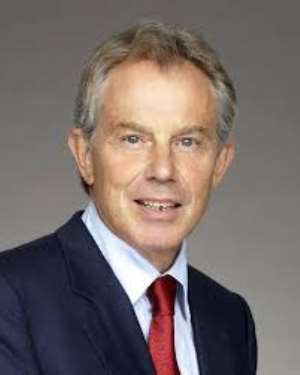
London, Sept. 8, GNA - Former British Labour Prime Minister Tony Blair asked current Prime Minister David Cameron to save Libyan leader Muammar Gaddafi before NATO air strikes in 2011 in support of rebels trying to oust him, it has been claimed in a new biography of Mr Cameron.
In extracts published in The Mail on Sunday newspaper in London, the biographer, Sir Anthony Seldon, said that Mr Cameron rejected Mr Blair's plea.
This, though, has not stopped MPs of the British parliament from calling on Mr Blair to explain why he made such a request.
The parliamentary foreign affairs committee is currently conducting an inquiry into Libya.
'If this is true then we need to better understand what happened,' Nadhim Zahawi, a member of the committee, told The Times newspaper.
'With these revelations we should be pushing for Blair to come and explain as part of the inquiry.'
Indeed, Mr Blair's links to Libya and Colonel Gaddafi are full of contradictions.
During the bloody civil war in Sierra Leone between 1991 and 2002, Gaddafi supported the rebels of the Revolutionary United Front who had a bizarre predilection for chopping off the limbs of their opponents.
Under Blair's government, British troops were sent to Sierra Leone to help restore calm just after the end of the war.
Mr. Blair's government was instrumental in the setting up in 2002 of the Special Court for Sierra Leone (SCSL), which was meant to try those who "bear the greatest responsibility" for violations of international humanitarian law and Sierra Leonean law since November 30, 1996.
The then Liberian President, Charles Taylor, was charged with war crimes and crimes against humanity for the atrocities in Sierra Leone and eventually sentenced to 50 years in prison, currently being served in the UK.
According to the first prosecutor of the SCSL, the American David Crane, he had also wanted to indict Gaddafi but he said that Western countries and the UN prevailed on him not to charge the Libyan leader.
Mr Crane claimed that Mr Blair, whose government was in power then, especially applied pressure on the UN, which accommodated the request not to charge Gaddafi.
He told The Times: 'It was my political sense, dealing with senior leadership in the United Kingdom, United States, Canada, United Nations and the Netherlands, that this [indicting Gaddafi] would not be welcome.
'This [Gaddafi's involvement] is not speculation on my part.
'We named and shamed him in the actual indictment,' Mr Crane added.
By then Western attitude to Gaddafi had changed after Mr Blair got him to destroy his weapons of mass destruction.
The Libyan leader was brought in from the cold and he and his country were no longer international pariahs.
But this was not to last, as events of 2011 showed, with NATO war planes supporting armed opponents fighting against Libyan government forces, leading to the killing of Gaddafi by the rebels.
In Blair Inc.: The Man Behind the Mask published in London this year, the authors explain; 'Papers found in Tripoli after Colonel Muammar Gaddafi's overthrow in 2011 showed that Blair held at least six private meetings with the Libyan dictator in the three years after he left Downing Street [office of the UK prime minister], which probably encouraged Gaddafi in his mistaken assumption that the West would not act against him.'
Mr Blair's activities since he resigned as prime minister on June 27, 2007 have been under constant and intense media and political scrutiny.
In Blair Inc. the authors note: 'Since leaving office in 2007, the empire of Tony Blair has grown exponentially.
'As a businessman he has been unprecedentedly successful for a former public servant, with a large property portfolio and an estimated £80 million of earnings accrued in just a few short years.'
GNA




 Akufo-Addo commissions Phase II of Kaleo solar power plant
Akufo-Addo commissions Phase II of Kaleo solar power plant
 NDC panics over Bawumia’s visit to Pope Francis
NDC panics over Bawumia’s visit to Pope Francis
 EC blasts Mahama over “false” claims on recruitment of Returning Officers
EC blasts Mahama over “false” claims on recruitment of Returning Officers
 Lands Minister gives ultimatum to Future Global Resources to revamp Prestea/Bogo...
Lands Minister gives ultimatum to Future Global Resources to revamp Prestea/Bogo...
 Wa Naa appeals to Akufo-Addo to audit state lands in Wa
Wa Naa appeals to Akufo-Addo to audit state lands in Wa
 Prof Opoku-Agyemang misunderstood Bawumia’s ‘driver mate’ analogy – Miracles Abo...
Prof Opoku-Agyemang misunderstood Bawumia’s ‘driver mate’ analogy – Miracles Abo...
 EU confident Ghana will not sign Anti-LGBTQI Bill
EU confident Ghana will not sign Anti-LGBTQI Bill
 Suspend implementation of Planting for Food and Jobs for 2024 - Stakeholders
Suspend implementation of Planting for Food and Jobs for 2024 - Stakeholders
 Tema West Municipal Assembly gets Ghana's First Female Aircraft Marshaller as ne...
Tema West Municipal Assembly gets Ghana's First Female Aircraft Marshaller as ne...
 Dumsor is affecting us double, release timetable – Disability Federation to ECG
Dumsor is affecting us double, release timetable – Disability Federation to ECG
